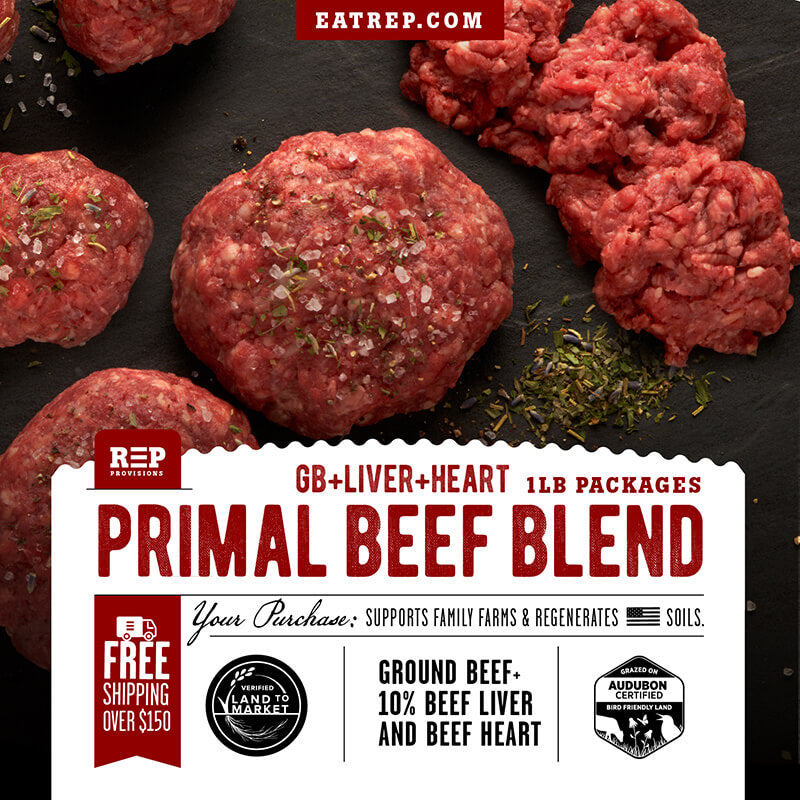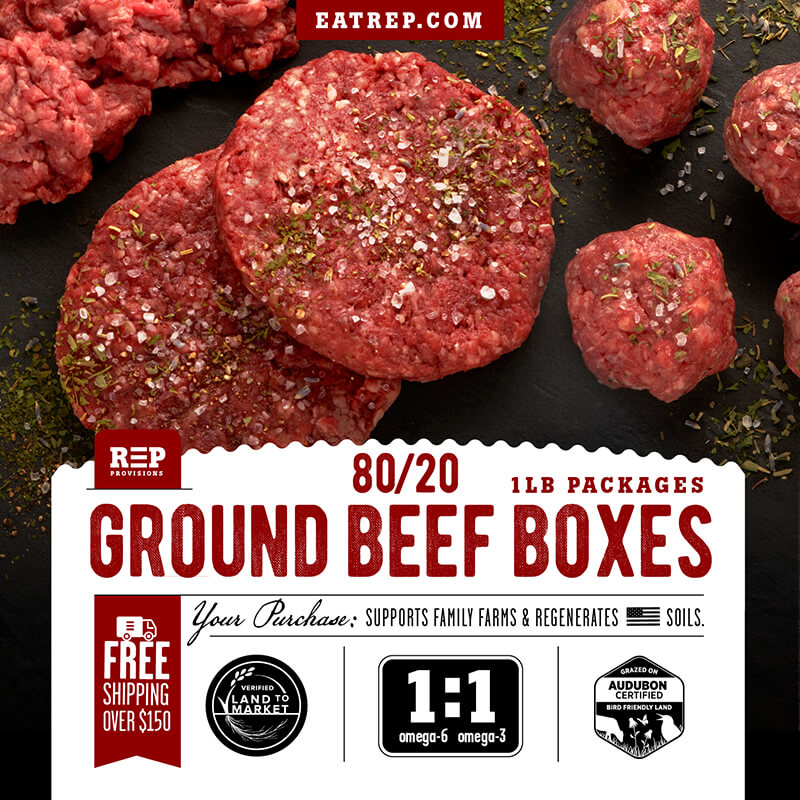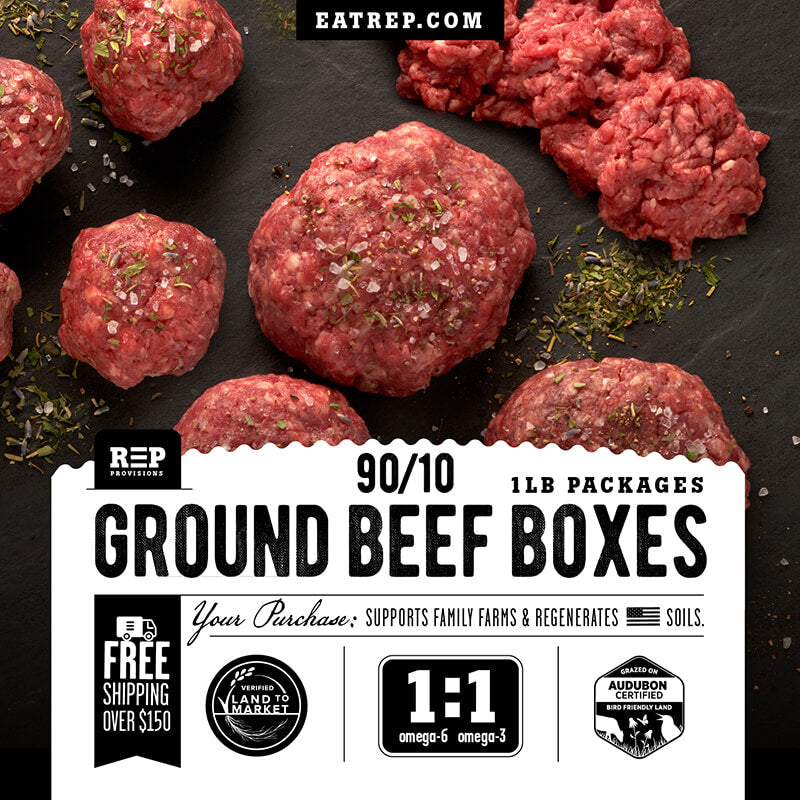
In a world quickly becoming more conscious of how food choices impact our health and the environment, many consumers like yourself have turned to online meat delivery services for quality, convenience, and sustainability. Two of the most prominent names in this space are REP Provisions and ButcherBox. While both brands offer high-quality meats, the differences between them—especially in sustainability and supply chain practices—are significant.
Here’s are 5 ways REP Provisions is leading the charge in regenerative agriculture and why our approach goes beyond traditional sustainability models.
1: Regenerative Agriculture vs. Grass-Fed Beef: What’s the Difference?
ButcherBox offers grass-fed beef, which is often considered a better option compared to conventional grain-fed livestock. However, REP Provisions’, grass-fed and grass-finished beef takes sustainability a step further with a commitment to regenerative agriculture.
What is Regenerative Agriculture? Regenerative agriculture is about more than just reducing harm; it’s about actively restoring ecosystems. Our grazing practices are designed to mimic natural herd movements, which promotes soil health, increases biodiversity, and enhances water retention. The result? Healthier ecosystems that in-turn create meats with more flavor and higher nutrient-density.
ButcherBox focuses on grass-fed and pasture-raised meats, which is great, but it doesn’t address the long-term health of the land. REP Provisions goes beyond sustainable to regenerative, creating a closed-loop system where the land is continually improving.
2: 100% American-Raised vs. Global Sourcing: Supporting Local Farms
One of the most significant differences in the supply chain between REP Provisions and ButcherBox is where the meat is sourced. REP Provisions is unwavering in our commitment to sourcing from 100% American small family farms. We believe in the power of local farming to support rural communities, protect American farmland, and drive local economies.
-
ButcherBox sources its meat from multiple countries, but the majority of their beef comes Australia and New Zealand. While the company emphasizes quality and sustainability, global sourcing creates a disconnect from the farmers themselves, and shipping around the world has a much larger carbon footprint. Another downside is the time it takes for the product to go through the supply chain and reach the consumer. The longer it takes the less fresh the meat is.
- At REP Provisions, every cut of beef comes from small, family-owned farms within the United States. These aren’t massive industrial operations; they’re farms run by real people with a deep connection to the land, who are dedicated to regenerative practices. By partnering exclusively with these farmers, we are not only producing meat that is healthier for you and the planet, but we are also supporting local economies and ensuring the survival of small-scale, regenerative farming.
Small family farms are the backbone of rural America. When you purchase from REP, you’re doing more than buying meat—you’re investing in local communities, helping to preserve American prairies, and keeping your dollars within our own economy. This commitment ensures that our food system remains decentralized, transparent, and deeply rooted in values that protect both the environment and the people behind the product.
3: Certified by Land to Market: The Gold Standard for Regeneration
At REP Provisions, we don’t just claim to be regenerative; we back it up. Our beef is certified by Land to Market, the first verified sourcing solution for regenerative agriculture. This certification ensures that our practices are regenerating the land and healing the damage caused by conventional farming methods.
While ButcherBox emphasizes sustainably raised meat, they do not have the same level of third-party verification specifically focused on regenerative agriculture. Our partnership with Land to Market guarantees that our products are not only sustainable but actively improving the land that the meat is raised on.
4: The Importance of Soil Health
Healthy soil is the foundation of a healthy planet. By using holistic grazing practices, REP Provisions regenerates the land and rebuilds soil health, leading to more nutrient-dense food and improved ecosystems. Regenerative farming methods allow soil to capture more carbon from the atmosphere, enhancing biodiversity and water cycles.
ButcherBox’s grass-fed meat is a step in the right direction, but without a direct focus on rebuilding soil health and regenerating the land, it doesn't provide the same long-term environmental benefits. REP Provisions is helping restore soil ecosystems, ensuring that future generations inherit a healthier planet.
5: Sustainability Is Not Enough: Why We Choose Regeneration
Many companies, including ButcherBox, tout sustainability as something valued. But at REP Provisions, we believe sustainability is only part of the solution. Our food system and prairies are in crisis, and simply sustaining the status quo isn’t enough.
Regeneration means healing the damage that’s been done. It’s about working with nature to rebuild grassland ecosystems, restore biodiversity, and create a food system that gives back to the land rather than just taking from it. Our commitment to regenerative agriculture isn’t a buzzword; it’s a mission to leave the land and soils better than we found them
The REP Difference: Regenerative Agriculture, Local Support, and 100% American Beef
At REP Provisions, we’re proud of the regenerative difference we offer. From our 100% American-raised, regenerative beef, sourced exclusively from small family farms, to our Land to Market certification, we stand on the front lines of the regenerative agriculture movement. By choosing REP, you’re not only investing in high-quality, nutrient-dense meat but also supporting American farmers, local economies, and the future of sustainable agriculture.




